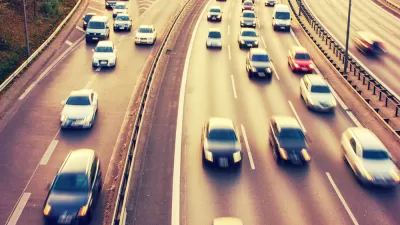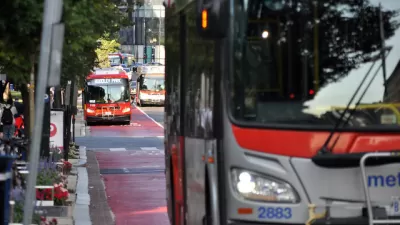Current commuter benefits favor employees driving to work instead of taking public transportation, despite years of advocacy and lobbying efforts in Congress.
In light of New York Democrat Senator Charles Schumer's current attempts to raise commuter benefits from their low levels, Emily Badger of The Washington Post explores some of the implications of this low incentive. As Badger notes, "If you're a driver, the federal commuter benefit allows you to spend up to $245 of your pre-tax income each month on parking at work. If you pay to take the bus or train instead, the benefit is only about half that — $130. For several years now, transit advocates have gone back and forth with Congress trying to equalize the benefits (or remove the bias, depending on how you look at it). And for a brief and glorious period, the Recovery Act (and some extensions) temporarily did that."
Having lower incentives for public transportation than driving makes the commute worse for everyone; it incentivizes more congestion, greater health risks, and longer commute times. The opposite incentive structure, where public transportation benefits are higher (allowing riders to also at least cover the full cost of their commute), improves commute times for drivers, and leads to fewer negative social externalities associated with driving.
According to Badger, the current level of benefits also requires, "commuters who don't use cars to pay what amounts to about $565 more in taxes every year, according to the American Public Transportation Association."
FULL STORY: Congress would rather you drive to work than take public transit

Alabama: Trump Terminates Settlements for Black Communities Harmed By Raw Sewage
Trump deemed the landmark civil rights agreement “illegal DEI and environmental justice policy.”

Study: Maui’s Plan to Convert Vacation Rentals to Long-Term Housing Could Cause Nearly $1 Billion Economic Loss
The plan would reduce visitor accommodation by 25% resulting in 1,900 jobs lost.

Planetizen Federal Action Tracker
A weekly monitor of how Trump’s orders and actions are impacting planners and planning in America.

Wind Energy on the Rise Despite Federal Policy Reversal
The Trump administration is revoking federal support for renewable energy, but demand for new projects continues unabated.

Passengers Flock to Caltrain After Electrification
The new electric trains are running faster and more reliably, leading to strong ridership growth on the Bay Area rail system.

Texas Churches Rally Behind ‘Yes in God’s Back Yard’ Legislation
Religious leaders want the state to reduce zoning regulations to streamline leasing church-owned land to housing developers.
Urban Design for Planners 1: Software Tools
This six-course series explores essential urban design concepts using open source software and equips planners with the tools they need to participate fully in the urban design process.
Planning for Universal Design
Learn the tools for implementing Universal Design in planning regulations.
Caltrans
Smith Gee Studio
Institute for Housing and Urban Development Studies (IHS)
City of Grandview
Harvard GSD Executive Education
Toledo-Lucas County Plan Commissions
Salt Lake City
NYU Wagner Graduate School of Public Service




























